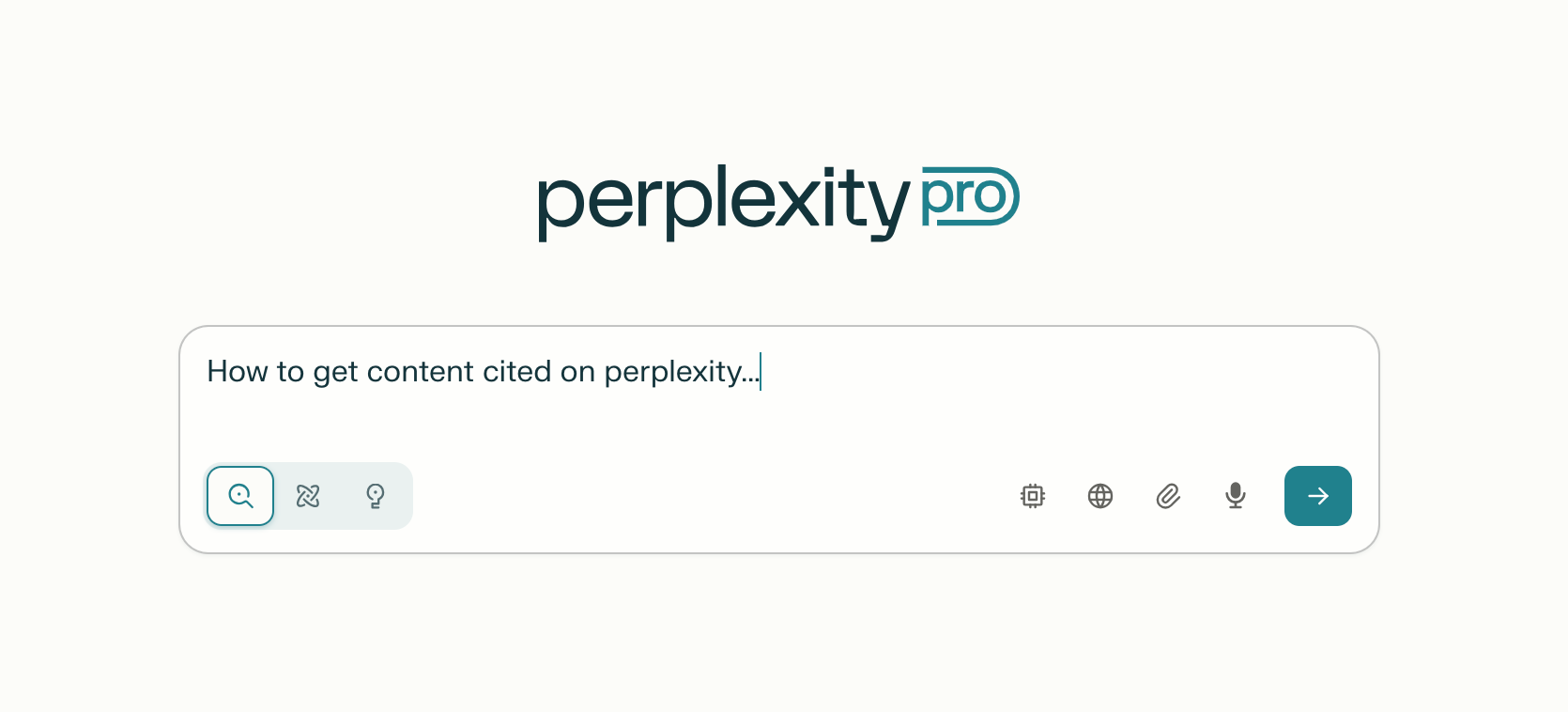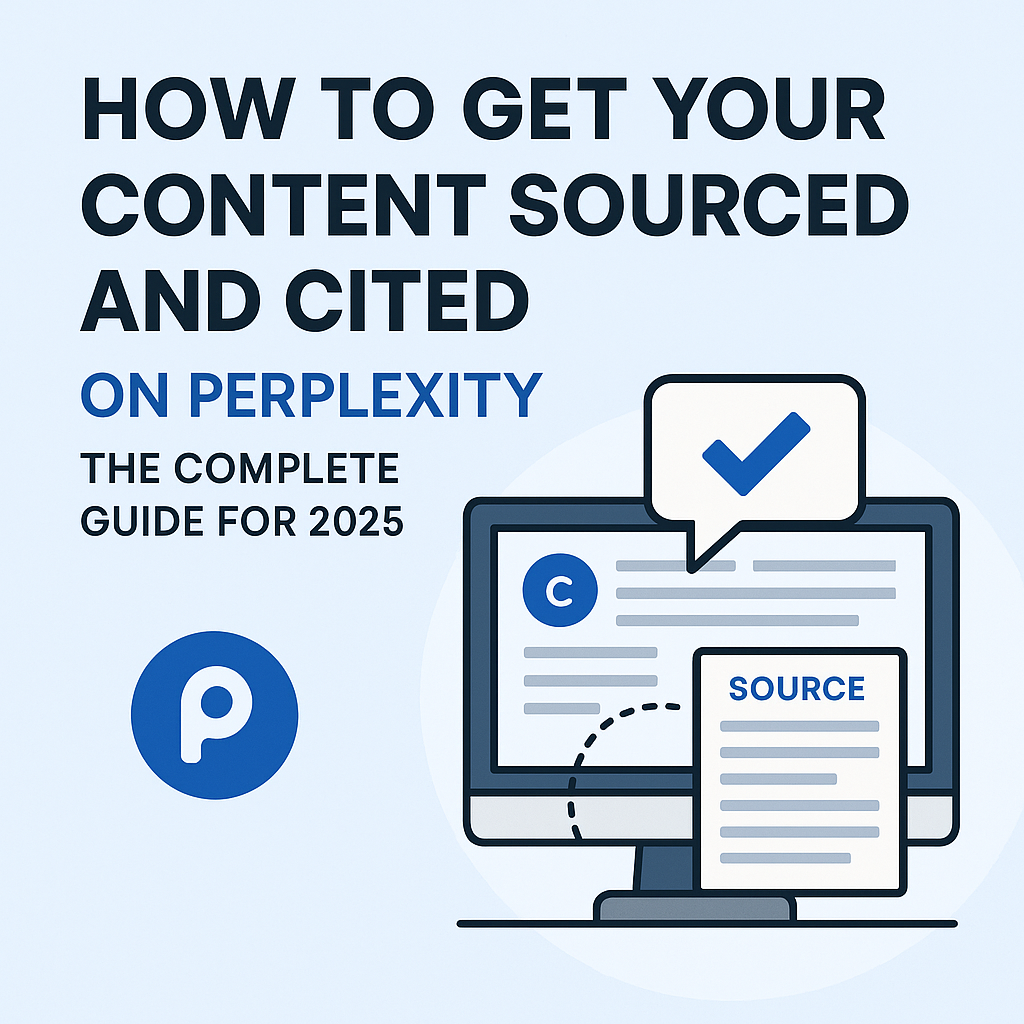How to Get Your Content Sourced and Cited on Perplexity: The Complete Guide for 2025

Master the art of AI search optimization and become a trusted source in the age of conversational search engines
The search landscape is rapidly evolving. While Google still dominates, AI-powered search engines like Perplexity are changing how people discover and consume information. Getting cited by Perplexity isn't just about visibility - it's about establishing your brand as a trusted authority in the AI-first search era.If you're a business owner, content creator, or SEO professional, understanding how to optimize for AI search engines is no longer optional - it's essential for staying competitive.

Why Perplexity Citations Matter More Than You Think
Perplexity AI has gained massive traction as users seek more conversational, context-aware search experiences. Unlike traditional search engines that show a list of links, Perplexity provides direct answers while citing its sources. This creates a unique opportunity: when your content gets cited, you're not just getting a backlink - you're being positioned as an expert source.The benefits are clear:
- Instant credibility as a trusted information source
- High-quality referral traffic from engaged users
- Brand authority in your industry vertical
- Future-proofing your SEO strategy for AI search
The Ultimate Strategy: 8 Pillars of Perplexity Optimization
1. Master Conversational Content Architecture
Perplexity thrives on natural, conversational content that directly answers user questions. Your content should mirror how people actually speak and ask questions.Action Steps:
- Structure content using question-answer formats
- Create comprehensive FAQ sections for each topic
- Write in a natural, conversational tone (avoid corporate jargon)
- Use transitional phrases that connect ideas logically
Example: Instead of "SEO Optimization Techniques," use "How to Optimize Your Website for Better Search Rankings"
2. Implement Entity-Based SEO Strategy
AI search engines understand entities (people, places, concepts) better than traditional keyword matching. Focus on building topical authority around specific entities in your niche.Action Steps:
- Identify core entities in your industry
- Create topic clusters around each entity
- Use schema markup to define entities clearly
- Link related entities within your content naturally
3. Optimize for Featured Snippet Domination
Perplexity often pulls information from content that's already optimized for featured snippets. Position zero optimization is your gateway to AI citations.Action Steps:
- Answer questions in 40-60 words at the beginning of sections
- Use bullet points, numbered lists, and comparison tables
- Include "definition" style answers for key terms
- Structure content with clear headings (H2, H3) that match search queries
4. Create Comprehensive, Authority-Building Content
AI search engines favor in-depth, thoroughly researched content that covers topics comprehensively. However, depth matters more than length. A well-researched 800-word expert piece often outperforms a shallow 3000-word article.Action Steps:
- Focus on content quality and depth of expertise over word count
- Cover subtopics and related questions within each article
- Include original research, data, and insights
- Update content regularly to maintain freshness
5. Leverage Natural Language Processing (NLP) Optimization
Optimize for semantic search by including related terms and concepts that AI can understand contextually.Action Steps:
- Use tools like MarketMuse or Clearscope for semantic keyword research
- Include synonyms and related terms naturally
- Write for topic relevance, not keyword density
- Use LSI (Latent Semantic Indexing) keywords throughout content
6. Build Technical SEO Foundation for AI
AI search engines need to easily crawl, understand, and categorize your content. Technical optimization supports your content but doesn't guarantee citations.Action Steps:
- Implement structured data markup (JSON-LD)
- Optimize Core Web Vitals (loading speed, interactivity, visual stability)
- Ensure mobile-first responsive design
- Create clean, logical site architecture
- Use descriptive URLs and meta descriptions
7. Establish Authority Through Trust Signals
Perplexity's RAG (Retrieval-Augmented Generation) system prioritizes content from authoritative, trustworthy sources. Building credibility signals is foundational to being recognized as a credible source.Action Steps:
- Include detailed author bios with expertise indicators
- Link to reputable, authoritative sources
- Earn high-quality backlinks from industry leaders
- Display credentials, certifications, and awards
- Use customer testimonials and case studies
8. Optimize for Voice and Conversational Search
As AI search becomes more conversational, optimize for how people naturally ask questions.Action Steps:
- Target long-tail, conversational keywords
- Include "near me" and local intent optimization
- Answer "who, what, when, where, why, how" questions explicitly
- Use natural speech patterns in your content
Reality Check: What the Experts Won't Tell You
The Truth About "Guaranteed" Citations
Let's be honest - there's no magic formula that guarantees Perplexity citations. While the strategies above significantly increase your chances, several factors remain outside your control:
- Algorithm Evolution: Perplexity's RAG system constantly evolves
- Partnership Changes: New partnerships with platforms like Reddit or major news outlets can shift citation patterns overnight
- Source Prioritization: The platform's evaluation criteria for trusted sources updates regularly
What this means for you: Focus on building long-term authority rather than chasing quick wins. The fundamentals (quality content, expertise, trustworthiness) remain constant even as algorithms change.
Beyond the Technical Tricks
Here's where many guides get it wrong - Perplexity's models prioritize substance over structure. While formatting helps readability, it's not a magic bullet:What actually matters most:
- Content quality and depth of expertise
- Relevance to user queries
- Established domain authority
- Consistent publishing of valuable insights
The reality: A concise, expert-backed piece often outperforms lengthy but shallow content, regardless of formatting tricks.
The Measurement Challenge
Unlike traditional SEO, tracking Perplexity citations isn't straightforward:Current limitations:
- No dedicated Perplexity analytics tools exist yet
- Citation tracking requires manual monitoring
- Referral traffic attribution can be inconsistent
Realistic tracking approach:
- Set up Google Alerts for your brand + "according to" or "cited by"
- Monitor overall referral traffic patterns from AI search platforms
- Track brand mention increases across AI platforms
- Focus on leading indicators (content engagement, expert recognition)
The Adaptive Reality
Here's the most important insight: Perplexity is adaptive by design. What works today may need adjustment tomorrow as:
- New data sources get integrated
- Partnership agreements change
- User behavior patterns evolve
- Competitive landscape shifts
Advanced Tactics: Going Beyond the Basics
Content Formatting for AI Consumption
Structure your content so AI can easily parse and understand it:
- Use clear headings that match search queries
- Create scannable content with bullet points and short paragraphs
- Include comparison tables for product/service comparisons
- Add summary boxes at the beginning of long articles
The Citation-Worthy Content Formula
Content that gets cited by Perplexity typically follows this pattern:
- Direct answer to the query (first 50 words)
- Supporting explanation with context
- Specific examples or case studies
- Actionable steps or recommendations
- Credible sources and data points
Your Sustainable Strategy Framework
Given Perplexity's adaptive nature, focus on:
- Build foundational authority that transcends algorithm changes
- Stay experimental with content formats and topics
- Monitor industry discussions about AI search evolution
- Maintain content freshness through regular updates
Real-World Success: Learning from the Winners
Looking at successful Perplexity citations, patterns emerge:
- Industry publications with original research get cited frequently
- How-to guides with step-by-step instructions perform well
- Data-driven content with statistics and studies gains authority
- Expert interviews and thought leadership pieces build credibility
Common Mistakes That Kill Your Citation Chances
Avoid these critical errors:
- Thin content that doesn't thoroughly address topics
- Poor technical SEO that prevents AI crawling
- Lack of expertise signals (no author bios, credentials)
- Outdated information that hasn't been refreshed
- Over-optimization instead of natural, valuable content
Your Action Plan: Getting Started Today
Ready to optimize for Perplexity citations? Here's your immediate action plan:Week 1-2: Foundation
- Audit your existing content for AI-readiness
- Implement basic schema markup
- Optimize Core Web Vitals
Week 3-4: Content Optimization
- Rewrite key pages in conversational format
- Add FAQ sections to important pages
- Create comprehensive topic cluster content
Week 5-6: Authority Building
- Add author bios and expertise indicators
- Reach out for high-quality backlinks
- Update outdated content with fresh data
Ongoing: Monitor and Adapt
- Track citation mentions and referral traffic manually
- Continuously update content based on performance
- Stay informed about AI search platform changes
- Experiment with new content formats and topics
The Future is Conversational (But Unpredictable)
As AI search engines like Perplexity continue to grow, the brands that adapt their SEO strategies now will have a competitive advantage. However, remember that the shift from traditional keyword optimization to conversational, entity-based SEO requires ongoing experimentation and adaptation.The key isn't to chase every algorithm change, but to build sustainable authority that performs well regardless of how AI search evolves.Start implementing these strategies today, but keep your expectations realistic. Focus on becoming a genuinely valuable source of information in your industry, and the citations will follow naturally.
